Module 12 Unit 3 Language in use课件+音频(共43张PPT) 外研版八年级上册
文档属性
| 名称 | Module 12 Unit 3 Language in use课件+音频(共43张PPT) 外研版八年级上册 | 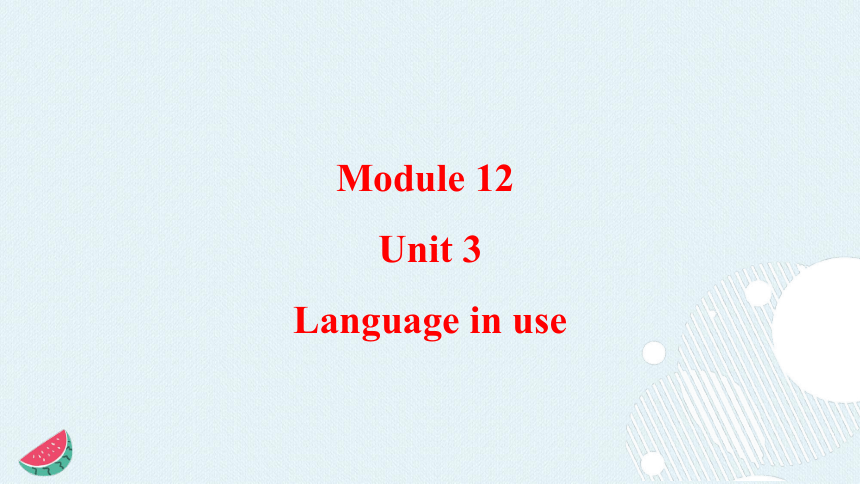 | |
| 格式 | pptx | ||
| 文件大小 | 11.1MB | ||
| 资源类型 | 教案 | ||
| 版本资源 | 外研版 | ||
| 科目 | 英语 | ||
| 更新时间 | 2024-08-05 23:36:43 | ||
图片预览

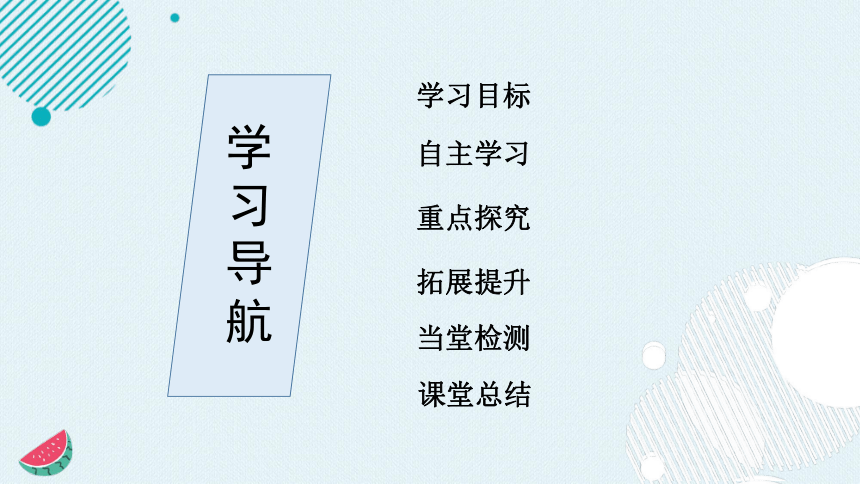
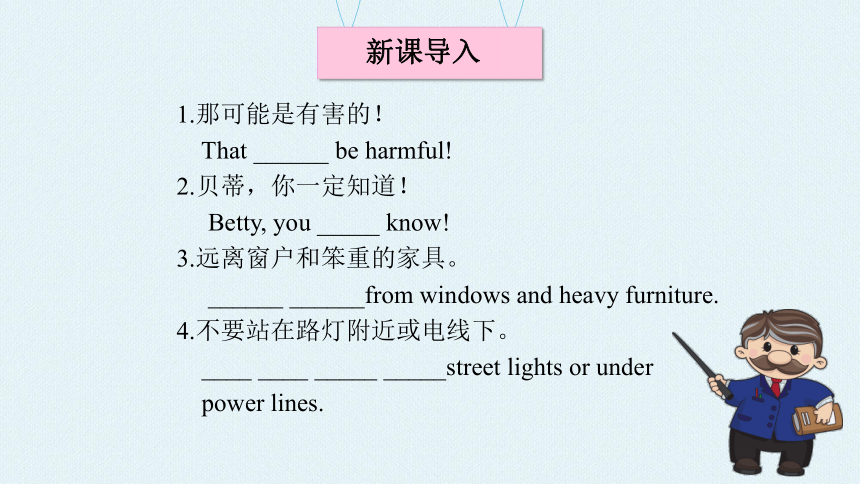
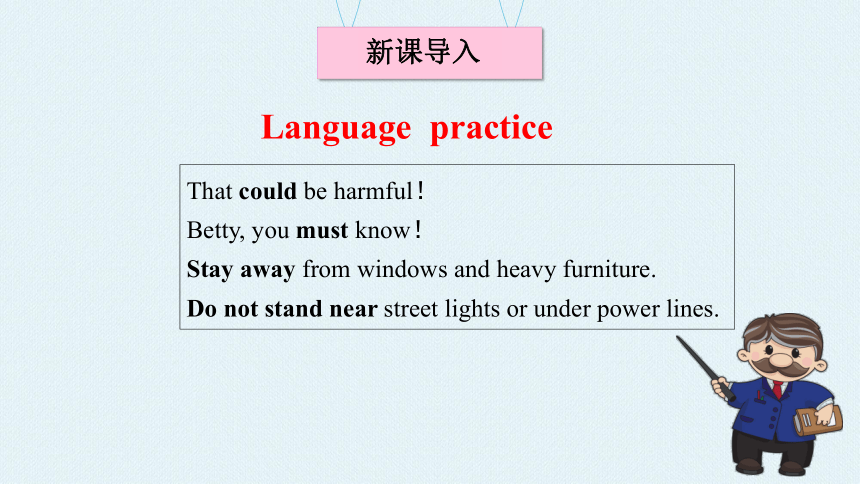
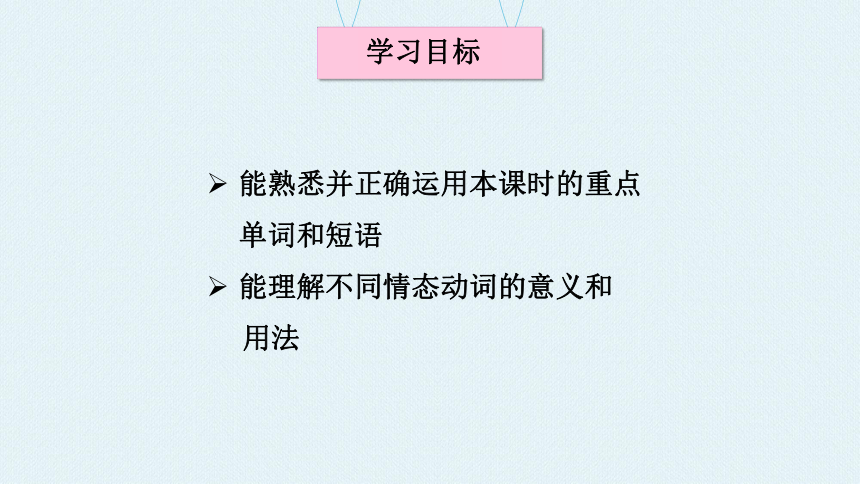
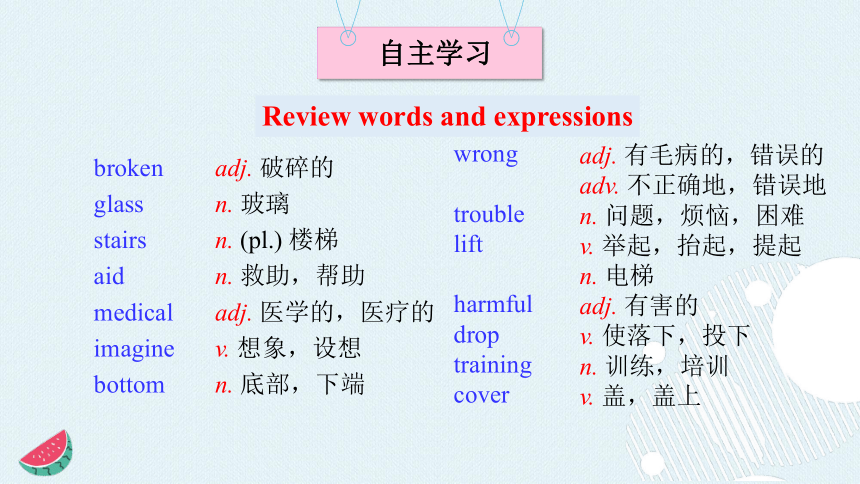
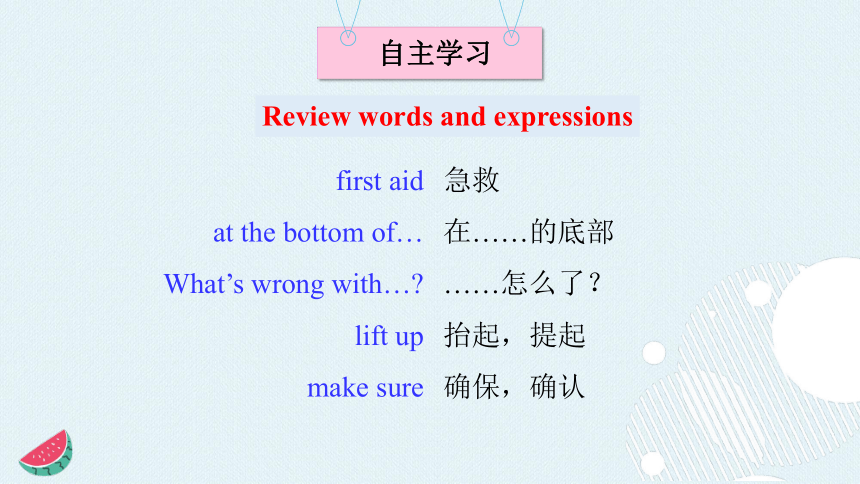
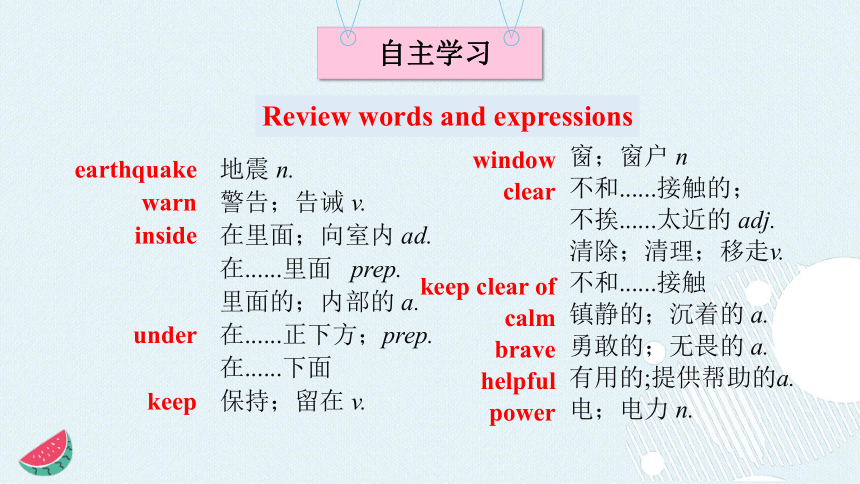
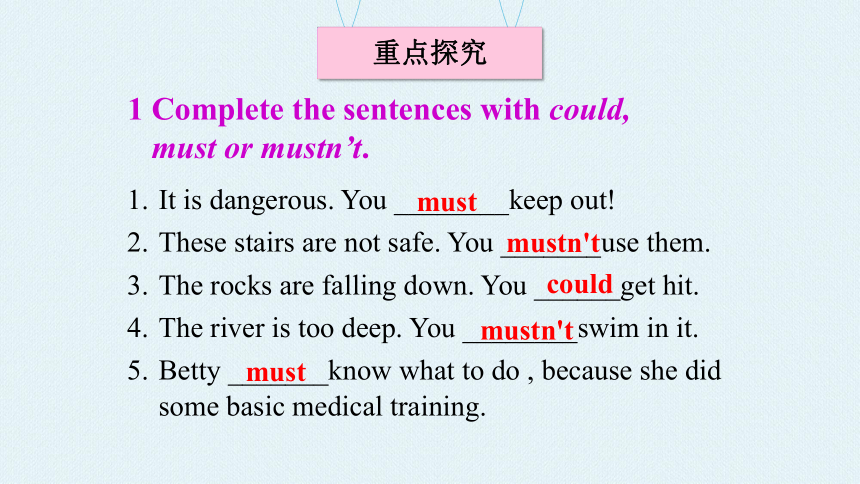
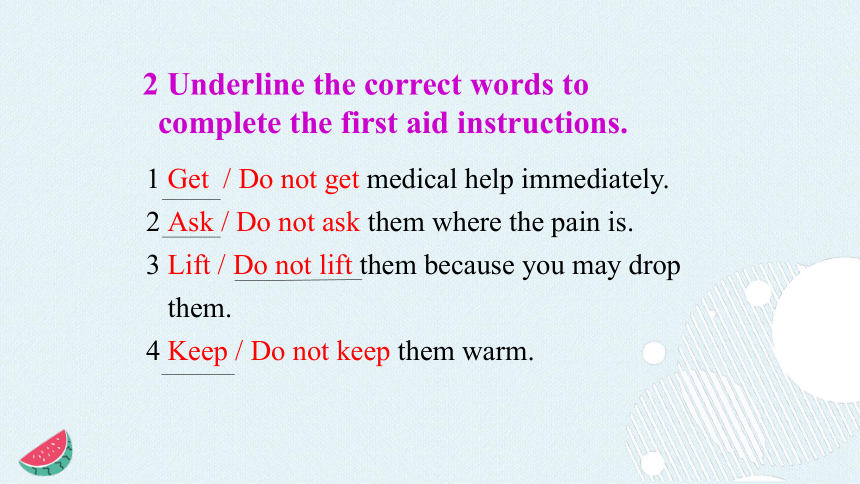
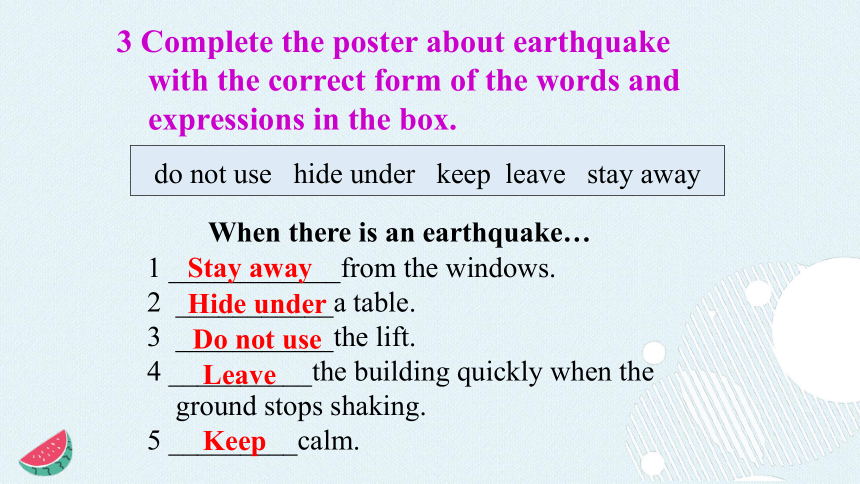
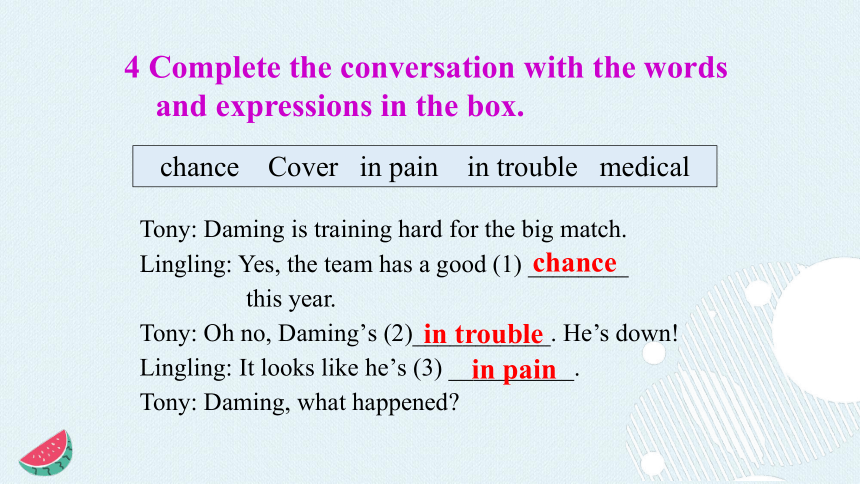
文档简介
(共43张PPT)
Module 12
Unit 3
Language in use
学习目标
重点探究
自主学习
学习导航
当堂检测
课堂总结
拓展提升
新课导入
1.那可能是有害的!
That ______ be harmful!
2.贝蒂,你一定知道!
Betty, you _____ know!
3.远离窗户和笨重的家具。
______ ______from windows and heavy furniture.
4.不要站在路灯附近或电线下。
____ ____ _____ _____street lights or under
power lines.
新课导入
Language practice
That could be harmful!
Betty, you must know!
Stay away from windows and heavy furniture.
Do not stand near street lights or under power lines.
学习目标
能熟悉并正确运用本课时的重点单词和短语
能理解不同情态动词的意义和
用法
自主学习
Review words and expressions
broken
glass
stairs
aid
medical
imagine
bottom
adj. 破碎的
n. 玻璃
n. (pl.) 楼梯
n. 救助,帮助
adj. 医学的,医疗的
v. 想象,设想
n. 底部,下端
wrong
trouble
lift
harmful
drop
training
cover
adj. 有毛病的,错误的
adv. 不正确地,错误地
n. 问题,烦恼,困难
v. 举起,抬起,提起
n. 电梯
adj. 有害的
v. 使落下,投下
n. 训练,培训
v. 盖,盖上
自主学习
Review words and expressions
first aid
at the bottom of…
What’s wrong with…
lift up
make sure
急救
在……的底部
……怎么了?
抬起,提起
确保,确认
自主学习
Review words and expressions
earthquake
warn
inside
under
keep
地震 n.
警告;告诫 v.
在里面;向室内 ad.
在......里面 prep.
里面的;内部的 a.
在......正下方;prep.
在......下面
保持;留在 v.
window
clear
keep clear of
calm
brave
helpful
power
窗;窗户 n
不和......接触的;
不挨......太近的 adj.
清除;清理;移走v.
不和......接触
镇静的;沉着的 a.
勇敢的;无畏的 a.
有用的;提供帮助的a.
电;电力 n.
重点探究
It is dangerous. You ________keep out!
These stairs are not safe. You _______use them.
The rocks are falling down. You ______get hit.
The river is too deep. You ________swim in it.
Betty _______know what to do , because she did some basic medical training.
1 Complete the sentences with could,
must or mustn’t.
must
mustn't
could
mustn't
must
2 Underline the correct words to
complete the first aid instructions.
1 Get / Do not get medical help immediately.
2 Ask / Do not ask them where the pain is.
3 Lift / Do not lift them because you may drop
them.
4 Keep / Do not keep them warm.
3 Complete the poster about earthquake with the correct form of the words and expressions in the box.
do not use hide under keep leave stay away
1 ____________from the windows.
2 ___________a table.
3 ___________the lift.
4 __________the building quickly when the
ground stops shaking.
5 _________calm.
When there is an earthquake…
Stay away
Hide under
Do not use
Leave
Keep
4 Complete the conversation with the words and expressions in the box.
Tony: Daming is training hard for the big match.
Lingling: Yes, the team has a good (1) ________
this year.
Tony: Oh no, Daming’s (2)___________. He’s down!
Lingling: It looks like he’s (3) __________.
Tony: Daming, what happened
chance Cover in pain in trouble medical
chance
in trouble
in pain
Daming: It’s my leg.
Lingling: (4) _________him with my coat.
Tony: But don’t move him. Let’s wait for
someone with (5)____________training.
Lingling: Ok.
Cover
medical
5 Complete the news report with the correct
form of the words in the box.
clear inside power rock trouble warn
Information is coming in that there could be (1)__________because of heavy rain in the north. The government is (2)__________people about falling (3)_______. Some roads have a lot of rocks on them, but people are trying to (4)_______them quickly. In some places there is no(5)________.And people must stay (6)______
to keep away from falling rocks.
trouble
warning
rocks
clear
power
inside
Now read the report again and check
(√) the true sentences.
1 There are problems everywhere because of rain.
2 The government is warning people about an
earthquake.
3 Some roads in the mountains have a lot of rocks
on them.
4 People are trying to clear the rocks off the roads.
5 There is no problem with power.
√
√
6 Listen and complete the sentences.
dinner
1 We were having _________at home when
the earthquake happened.
2 The room started to __________.
3 Father shouted to everyone to get under the
_______________.
4 We could not get out of the room because the __________would not open.
5 My father called for help on his ____________.
6 People came to help us and we left our_____.
shake
kitchen table
door
mobile phone
flat
7 Read the passage and choose the correct answer.
A ten-year-old girl saved about one hundred other tourists in 2004 by warning them that a tsunami, a huge ocean wave, was on its way across the sea. She knew what was happening because she learnt about underwater earthquake at school only a few weeks earlier, a newspaper reported.
“ I was on the beach and the water started to go funny,” Tilly Smith told the reporter from the newspaper. “There were bubbles and the water went back suddenly. I knew there was going to be a tsunami. I told Mum,” she said.
Tilly’s mother and the hotel workers acted quickly. They cleared people from the beach just minutes before a huge wave reached the land. Luckily, no one died.
Tilly’s teacher was very proud of her.“ She’s a very clever girl…It is very lucky that our class were learning about this kind of tsunami just two weeks before Christmas,” he told the newspaper.
1 What is the best title for this passage
a) 2004 Asian tsunami.
b) A girl saves tourists from tsunami.
c) Underwater earthquakes
2 What did Tilly notice
a) Water coming to the beach.
b) People watching the water.
c) Bubbles in the water.
3 What does her teacher think of Tilly
a) She is lucky.
b) She does not do silly things.
c) She is a clever student.
√
√
√
Special buildings in Japan
Earthquakes are very common in Japan. Many can cause a lot of damage. But now there are new ways of constructing buildings to make them safer and stronger during earthquakes. TheYokohama Landmark Tower is one of the tallest buildings in Japan.
Around the w rld
It is heavy and strong. It sits on rollers. This means
the earth can rise and fall
beneath the building
without shaking it.
Module task: Making a poster about
preventing accidents at school
8 Make a list of accidents that can happen
at school.
School accidents How where
Hurting hands/ knees/legs Running fast/ playing football Playground
Hitting your head Climbing a tree Garden
…
9 Work in groups. Choose an accident from the list in Activity 8 and give instructions about what to do.
First…
Second…
Third…
When there is a school accident…
10 Make a poster about preventing accidents at school using must / mustn't. Then Present your poster to the class.
拓展提升
A ten-year-old girl saved about one hundred other tourists ain 2004 by warning them that a tsunami, a huge ocean wave, was on its way across the sea.
1) A ten-year-old girl “一个十岁的女孩”
基数词 + year (注意单数) + old 用作形容词 表示 “多大年龄的……”
e.g. She has a eight- year- old brother.
2) warn sb. that…意为“提醒/警告某人注意… 如:I was going for swimming in the sea. The people in the hotel warned me that it may rain
in a few minutes.
我要去海里游泳,宾馆里的人提醒我可能过会要下雨。
3) on its way 在路上,在途中
She did a bit of shopping on the way home.
她在回家的路上买点东西。
2. Tilly’s teacher was very proud of her…
be proud of sb. 为某人感到自豪
e.g. I just want you to be proud of me, honey.
我只是想让你为我自豪,亲爱的。
If he becomes a doctor when he grows up,
his parents will be proud of him.
如果他长大后成了医生,他的父母会以他
为荣的。
一、情态动词must,can,could表示推测
1.我们学习过情态动词can和could用于对现在或将来的推测,意为“会,可能”,往往用于否定句和疑问句。用于疑问句时,can比could表示的“可能性”要大;用于否定句时,cannot (can’t) 表示“不可能”。如:
You can’t be serious!你不是认真的吧!
Grammar
could则可用于肯定句、否定句和疑问句。
在以下例句中,can和could均表示可能:
He could be in pain.他可能很疼。
That could be harmful!那可能有害!
Can/Could this be true 这有可能是真的吗?
2.情态动词must也可以表示猜测,意为“一定,准是”,通常只用于肯定句。
如:
Betty,you must know!
贝蒂,你肯定知道!
3.表示有把握的推测时,肯定句用must (一定,准是),
否定句用can’t (不可能,一定不)。
对现在情况的推测:must (can’t)+动词原形;
对现在正在进行的情况的推测:must (can’t)+be doing;
对过去情况的推测:must (can’t)+have done。
如:
You must be hungry after a long walk.
长途步行之后你一定饿了。
They must be waiting for us.Let’s hurry up.
他们一定在等我们。让我们快点走吧。
You must have left your bag in the theatre.
你准是把你的包丢在剧院了。
You can’t be hungry, you have just had your dinner.
你现在不可能觉得饿,你刚吃过饭。
He wears glasses all the time, his eyesight can’t be getting better.
他一直戴着眼镜,他的视力不可能在好转。
4.表示把握不大的推测即可能性时,用can和may,常译为“也许,可能”。
may用于肯定句与否定句,一般不用于疑问句。
can常用于疑问句,一般不用于肯定句。
如:
The news may or may not be true.
这消息也许是真的,也许不是真的。
At the moment she may be playing with her classmates.
此刻她可能正在和同学们玩耍。
Anna might not have seen Tom yesterday.
安娜昨天可能没有看见汤姆。
Where can Wei Fang be
魏芳会在哪里呢?
二、祈使句
祈使句表达说话人对对方的叮嘱、劝告、希望、禁止、建议、请求或命令等。祈使句一般以动词原形开头,无时态和数的变化。常见的句型如下:
1.动词原形构成的祈使句
此类祈使句暗含的主语是you,但通常省略。
否定句往往由do not (don’t)或never开头。祈使句的句首或句末有时加please,还可以加上称呼语,用逗号与句子主体隔开。如:
Don’t waste your time! 别浪费时间了!
Never be late again! 再也不要迟到了!
Please be quiet,boys! 男孩们,请安静!
Make sure he’s warm.确保他不受凉。
2. let’s构成的祈使句
这类祈使句往往用于提出建议。
如:
Let’s spend this weekend in the countryside.
咱们到乡下度过周末吧。
3. 无动词祈使句
在请求、命令和口号中,常用无动词祈使句,它实际上是省略了动词,从而使语句更简洁有力。如:
Just a minute,please! 请稍等!
This way,please! 请这边走!
当堂检测
一、用 must, can’t, can, could 填空。
1. —Fifty dollars for such a shirt You ____________be joking!
—I am serious.It is made of silk.
2. —It ____________be John who is in the office.
—I am sure it ____________be John.I saw him off at the railway station just 20 minutes ago.
must
must
can’t
当堂检测
3.Who sent the present ____________it be your brother
4.He is in poor health.He ____________be ill at any time.
5.Experts ____________also make mistakes.
Could/Can
could
could
课堂总结
Module 12
Unit 3
情态动词must, can, could表示推测
祈使句
重点短语:
ten-year-old
warn sb. that…
on its way
be proud of sb.
Module 12
Unit 3
Language in use
学习目标
重点探究
自主学习
学习导航
当堂检测
课堂总结
拓展提升
新课导入
1.那可能是有害的!
That ______ be harmful!
2.贝蒂,你一定知道!
Betty, you _____ know!
3.远离窗户和笨重的家具。
______ ______from windows and heavy furniture.
4.不要站在路灯附近或电线下。
____ ____ _____ _____street lights or under
power lines.
新课导入
Language practice
That could be harmful!
Betty, you must know!
Stay away from windows and heavy furniture.
Do not stand near street lights or under power lines.
学习目标
能熟悉并正确运用本课时的重点单词和短语
能理解不同情态动词的意义和
用法
自主学习
Review words and expressions
broken
glass
stairs
aid
medical
imagine
bottom
adj. 破碎的
n. 玻璃
n. (pl.) 楼梯
n. 救助,帮助
adj. 医学的,医疗的
v. 想象,设想
n. 底部,下端
wrong
trouble
lift
harmful
drop
training
cover
adj. 有毛病的,错误的
adv. 不正确地,错误地
n. 问题,烦恼,困难
v. 举起,抬起,提起
n. 电梯
adj. 有害的
v. 使落下,投下
n. 训练,培训
v. 盖,盖上
自主学习
Review words and expressions
first aid
at the bottom of…
What’s wrong with…
lift up
make sure
急救
在……的底部
……怎么了?
抬起,提起
确保,确认
自主学习
Review words and expressions
earthquake
warn
inside
under
keep
地震 n.
警告;告诫 v.
在里面;向室内 ad.
在......里面 prep.
里面的;内部的 a.
在......正下方;prep.
在......下面
保持;留在 v.
window
clear
keep clear of
calm
brave
helpful
power
窗;窗户 n
不和......接触的;
不挨......太近的 adj.
清除;清理;移走v.
不和......接触
镇静的;沉着的 a.
勇敢的;无畏的 a.
有用的;提供帮助的a.
电;电力 n.
重点探究
It is dangerous. You ________keep out!
These stairs are not safe. You _______use them.
The rocks are falling down. You ______get hit.
The river is too deep. You ________swim in it.
Betty _______know what to do , because she did some basic medical training.
1 Complete the sentences with could,
must or mustn’t.
must
mustn't
could
mustn't
must
2 Underline the correct words to
complete the first aid instructions.
1 Get / Do not get medical help immediately.
2 Ask / Do not ask them where the pain is.
3 Lift / Do not lift them because you may drop
them.
4 Keep / Do not keep them warm.
3 Complete the poster about earthquake with the correct form of the words and expressions in the box.
do not use hide under keep leave stay away
1 ____________from the windows.
2 ___________a table.
3 ___________the lift.
4 __________the building quickly when the
ground stops shaking.
5 _________calm.
When there is an earthquake…
Stay away
Hide under
Do not use
Leave
Keep
4 Complete the conversation with the words and expressions in the box.
Tony: Daming is training hard for the big match.
Lingling: Yes, the team has a good (1) ________
this year.
Tony: Oh no, Daming’s (2)___________. He’s down!
Lingling: It looks like he’s (3) __________.
Tony: Daming, what happened
chance Cover in pain in trouble medical
chance
in trouble
in pain
Daming: It’s my leg.
Lingling: (4) _________him with my coat.
Tony: But don’t move him. Let’s wait for
someone with (5)____________training.
Lingling: Ok.
Cover
medical
5 Complete the news report with the correct
form of the words in the box.
clear inside power rock trouble warn
Information is coming in that there could be (1)__________because of heavy rain in the north. The government is (2)__________people about falling (3)_______. Some roads have a lot of rocks on them, but people are trying to (4)_______them quickly. In some places there is no(5)________.And people must stay (6)______
to keep away from falling rocks.
trouble
warning
rocks
clear
power
inside
Now read the report again and check
(√) the true sentences.
1 There are problems everywhere because of rain.
2 The government is warning people about an
earthquake.
3 Some roads in the mountains have a lot of rocks
on them.
4 People are trying to clear the rocks off the roads.
5 There is no problem with power.
√
√
6 Listen and complete the sentences.
dinner
1 We were having _________at home when
the earthquake happened.
2 The room started to __________.
3 Father shouted to everyone to get under the
_______________.
4 We could not get out of the room because the __________would not open.
5 My father called for help on his ____________.
6 People came to help us and we left our_____.
shake
kitchen table
door
mobile phone
flat
7 Read the passage and choose the correct answer.
A ten-year-old girl saved about one hundred other tourists in 2004 by warning them that a tsunami, a huge ocean wave, was on its way across the sea. She knew what was happening because she learnt about underwater earthquake at school only a few weeks earlier, a newspaper reported.
“ I was on the beach and the water started to go funny,” Tilly Smith told the reporter from the newspaper. “There were bubbles and the water went back suddenly. I knew there was going to be a tsunami. I told Mum,” she said.
Tilly’s mother and the hotel workers acted quickly. They cleared people from the beach just minutes before a huge wave reached the land. Luckily, no one died.
Tilly’s teacher was very proud of her.“ She’s a very clever girl…It is very lucky that our class were learning about this kind of tsunami just two weeks before Christmas,” he told the newspaper.
1 What is the best title for this passage
a) 2004 Asian tsunami.
b) A girl saves tourists from tsunami.
c) Underwater earthquakes
2 What did Tilly notice
a) Water coming to the beach.
b) People watching the water.
c) Bubbles in the water.
3 What does her teacher think of Tilly
a) She is lucky.
b) She does not do silly things.
c) She is a clever student.
√
√
√
Special buildings in Japan
Earthquakes are very common in Japan. Many can cause a lot of damage. But now there are new ways of constructing buildings to make them safer and stronger during earthquakes. TheYokohama Landmark Tower is one of the tallest buildings in Japan.
Around the w rld
It is heavy and strong. It sits on rollers. This means
the earth can rise and fall
beneath the building
without shaking it.
Module task: Making a poster about
preventing accidents at school
8 Make a list of accidents that can happen
at school.
School accidents How where
Hurting hands/ knees/legs Running fast/ playing football Playground
Hitting your head Climbing a tree Garden
…
9 Work in groups. Choose an accident from the list in Activity 8 and give instructions about what to do.
First…
Second…
Third…
When there is a school accident…
10 Make a poster about preventing accidents at school using must / mustn't. Then Present your poster to the class.
拓展提升
A ten-year-old girl saved about one hundred other tourists ain 2004 by warning them that a tsunami, a huge ocean wave, was on its way across the sea.
1) A ten-year-old girl “一个十岁的女孩”
基数词 + year (注意单数) + old 用作形容词 表示 “多大年龄的……”
e.g. She has a eight- year- old brother.
2) warn sb. that…意为“提醒/警告某人注意… 如:I was going for swimming in the sea. The people in the hotel warned me that it may rain
in a few minutes.
我要去海里游泳,宾馆里的人提醒我可能过会要下雨。
3) on its way 在路上,在途中
She did a bit of shopping on the way home.
她在回家的路上买点东西。
2. Tilly’s teacher was very proud of her…
be proud of sb. 为某人感到自豪
e.g. I just want you to be proud of me, honey.
我只是想让你为我自豪,亲爱的。
If he becomes a doctor when he grows up,
his parents will be proud of him.
如果他长大后成了医生,他的父母会以他
为荣的。
一、情态动词must,can,could表示推测
1.我们学习过情态动词can和could用于对现在或将来的推测,意为“会,可能”,往往用于否定句和疑问句。用于疑问句时,can比could表示的“可能性”要大;用于否定句时,cannot (can’t) 表示“不可能”。如:
You can’t be serious!你不是认真的吧!
Grammar
could则可用于肯定句、否定句和疑问句。
在以下例句中,can和could均表示可能:
He could be in pain.他可能很疼。
That could be harmful!那可能有害!
Can/Could this be true 这有可能是真的吗?
2.情态动词must也可以表示猜测,意为“一定,准是”,通常只用于肯定句。
如:
Betty,you must know!
贝蒂,你肯定知道!
3.表示有把握的推测时,肯定句用must (一定,准是),
否定句用can’t (不可能,一定不)。
对现在情况的推测:must (can’t)+动词原形;
对现在正在进行的情况的推测:must (can’t)+be doing;
对过去情况的推测:must (can’t)+have done。
如:
You must be hungry after a long walk.
长途步行之后你一定饿了。
They must be waiting for us.Let’s hurry up.
他们一定在等我们。让我们快点走吧。
You must have left your bag in the theatre.
你准是把你的包丢在剧院了。
You can’t be hungry, you have just had your dinner.
你现在不可能觉得饿,你刚吃过饭。
He wears glasses all the time, his eyesight can’t be getting better.
他一直戴着眼镜,他的视力不可能在好转。
4.表示把握不大的推测即可能性时,用can和may,常译为“也许,可能”。
may用于肯定句与否定句,一般不用于疑问句。
can常用于疑问句,一般不用于肯定句。
如:
The news may or may not be true.
这消息也许是真的,也许不是真的。
At the moment she may be playing with her classmates.
此刻她可能正在和同学们玩耍。
Anna might not have seen Tom yesterday.
安娜昨天可能没有看见汤姆。
Where can Wei Fang be
魏芳会在哪里呢?
二、祈使句
祈使句表达说话人对对方的叮嘱、劝告、希望、禁止、建议、请求或命令等。祈使句一般以动词原形开头,无时态和数的变化。常见的句型如下:
1.动词原形构成的祈使句
此类祈使句暗含的主语是you,但通常省略。
否定句往往由do not (don’t)或never开头。祈使句的句首或句末有时加please,还可以加上称呼语,用逗号与句子主体隔开。如:
Don’t waste your time! 别浪费时间了!
Never be late again! 再也不要迟到了!
Please be quiet,boys! 男孩们,请安静!
Make sure he’s warm.确保他不受凉。
2. let’s构成的祈使句
这类祈使句往往用于提出建议。
如:
Let’s spend this weekend in the countryside.
咱们到乡下度过周末吧。
3. 无动词祈使句
在请求、命令和口号中,常用无动词祈使句,它实际上是省略了动词,从而使语句更简洁有力。如:
Just a minute,please! 请稍等!
This way,please! 请这边走!
当堂检测
一、用 must, can’t, can, could 填空。
1. —Fifty dollars for such a shirt You ____________be joking!
—I am serious.It is made of silk.
2. —It ____________be John who is in the office.
—I am sure it ____________be John.I saw him off at the railway station just 20 minutes ago.
must
must
can’t
当堂检测
3.Who sent the present ____________it be your brother
4.He is in poor health.He ____________be ill at any time.
5.Experts ____________also make mistakes.
Could/Can
could
could
课堂总结
Module 12
Unit 3
情态动词must, can, could表示推测
祈使句
重点短语:
ten-year-old
warn sb. that…
on its way
be proud of sb.
同课章节目录
- Module 1 How to learn English
- Unit 1 Let's try to speak English as much as possi
- Unit 2 You should smile at her.
- Unit 3 Language in use .
- Module 2 My home town and my country
- Unit 1 It's taller than many other buildings.
- Unit 2 Cambridge is a beautiful city in the east o
- Unit 3 Language in use .
- Module 3 Sports.
- Unit 1 Nothing is more exciting than playing tenni
- Unit 2 This year we training more carefully.
- Unit 3 Language in use .
- Module 4 Planes, ships and trains .
- Unit 1 He lives the farthest from school.
- Unit 2 What is the best way to travel.
- Unit 3 Language in use .
- Module 5 Lao She Teahouse.
- Unit 1 I wanted to see the Beijing Opera.
- Unit 2 It descibes the changes in Chinese society.
- Unit 3 Language in use .
- Module 6 Animals in danger.
- Unit 1 It allows people to get closer to them .
- Unit 2 The WWF is working hard to save them all.
- Unit 3 Language in use .
- Revision module A
- Module 7 A famous story
- Unit 1 Alice was sitting with her sister by the ri
- Unit 2 She was thinking about her cat.
- Unit 3 Language in use .
- Module 8 Accidents
- Unit 1 While the car were changing to red, a car s
- Unit 2 I was trying to pick it up when it bite me
- Unit 3 Language in use .
- Module 9 Population
- Unit 1 The population of China is about 1.37 billi
- Unit 2 Arnwick was a city with 200,000 people.
- Unit 3 Language in use .
- Module 10 The weathe
- Unit 1 It might snow.
- Unit 2 The weather is fine all year round.
- Unit 3 Language in use .
- Module 11 Way of life
- Unit 1 In China ,we open a gift later.
- Unit 2 In England, you usually drink tea with milk
- Unit 3 Language in use .
- Module 12 Help
- Unit 1 What should we do before help arrives?
- Unit 2 Stay away from windows and heavy furniture.
- Unit 3 Language in use .
- Revision module B
